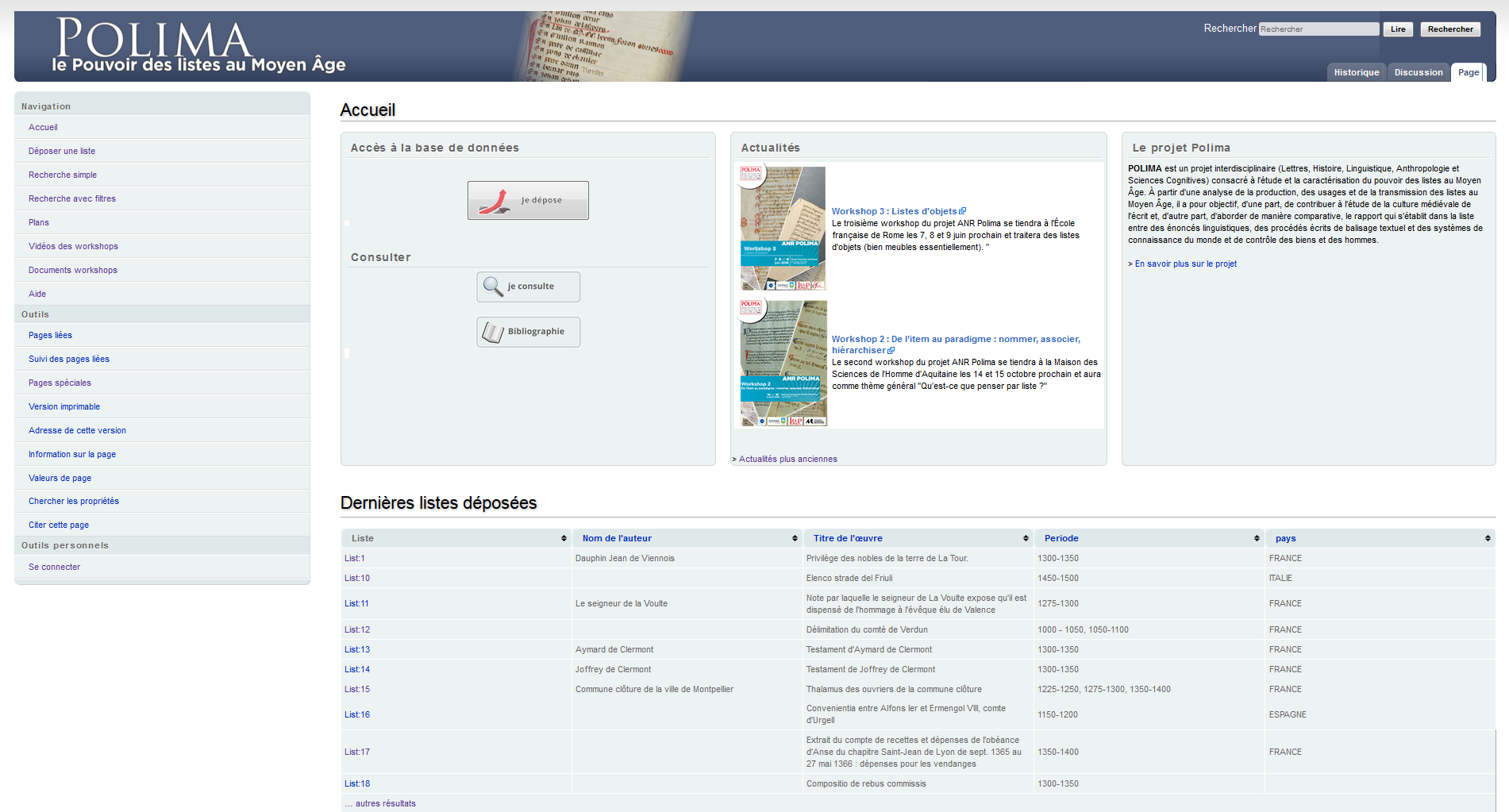 Résumé du projet :
Résumé du projet :POLIMA est un projet interdisciplinaire (Lettres, Histoire, Linguistique, Anthropologie et Sciences Cognitives) consacré à l’étude et la caractérisation du pouvoir des listes au Moyen Âge. À partir d’une analyse de la production, des usages et de la transmission des listes au Moyen Âge, il a pour objectif, d’une part, de contribuer à l’étude de la culture médiévale de l’écrit et, d’autre part, d’aborder de manière comparative, le rapport qui s’établit dans la liste entre des énoncés linguistiques, des procédés écrits de balisage textuel et des systèmes de connaissance du monde et de contrôle des biens et des hommes.
La liste est une forme d’écriture commune à de très nombreuses productions textuelles du Moyen Âge dont la présence dans les textes s’accroît très fortement avec le pragmatic turn que connaissent les sociétés occidentales au XIIIe siècle. Fréquemment utilisée par les scripteurs, elle constitue dans certains cas un type textuel en soi, employé dans des contextes très variés, qui vont de l’agencement d’informations à propos d’une action, d’un sujet ou d’un domaine du savoir (concordances, listes d’auteurs, souscriptions, index, florilèges ...), à l’énumération des propriétés et des parties d’objets dotés d’une consistance matérielle (inventaires, catalogues, éloges urbains…), à la production de taxinomies territoriales, fiscales ... Prenant acte des importantes variations affectant pour un même texte la forme de connexion des éléments rassemblés, nous avons retenu, comme cadre de travail, une définition de la liste de nature syntaxique. Tout texte construit selon une forme parataxique peut entrer dans le corpus, ce qui conduit à englober ce que le vocabulaire courant désigne comme des énumérations, listes, catalogues, inventaires, dénombrements...
Le projet scientifique POLIMA est constitué de plusieurs volets scientifiques complémentaires. Le rassemblement et la mise en ligne d’une bibliographie et d’un corpus de « textes à listes » constituera la base analytique du travail collectif. Ces textes seront étudiés dans sept workshops successifs. Partant d’une approche topique de la liste, afin de favoriser le travail interdisciplinaire et d’éprouver en particulier les frontières du poétique, du didactique et du pragmatique, la réflexion se portera ensuite sur les combinatoires, taxinomies et agrégats produits par la mise en liste. À partir des résultats obtenus, une synthèse sur les « Pouvoirs de la liste au Moyen Âge » sera rédigée de manière collaborative. On s’attachera en particulier à préciser le lien qui unit au Moyen Âge, dans un moment de mutation essentiel de la culture de l’écrit en Occident, les formes de la pensée aux pratiques écrites permises par un nouvel état historique du système de communication. En décrivant les formes concrètes d’organisation de l’information et de production du savoir offertes par la délinéarisation du texte et leurs implications sur l’évolution des modes de connaissance et de contrôle des biens et des hommes, le projet permettra d’initier un comparatisme entre deux moments historiques de rupture dans le système de communication, le Moyen Âge central et le XXIe siècle.
Dans cette perspective, trois axes seront privilégiés : 1) étudier sur le temps long les formes de classement et d’indexation du savoir et du patrimoine (tables, concordances, index, inventaires...) dont la société contemporaine est héritière et qui ont connu, à partir des e-XIIIe siècles, un développement et un niveau de sophistication inédits 2) évaluer l’implication de leur mise au point et de leur diffusion sur les processus de formalisation et de transmission matérielle des textes, des objets, des savoirs et des savoir-faire 3) réévaluer dans l’histoire de l’Occident, la place de la pensée algorithmique dans l’émergence des formes de rationalité.
 Le wiki du projet :
Le wiki du projet :
> En savoir plus [PDF - 287 Ko]
 Université de Versailles Saint-Quentin-en-Yvelines – Laboratoire ESR/DYPAC
Université de Versailles Saint-Quentin-en-Yvelines – Laboratoire ESR/DYPAC Université Paris 1 – LAMOP : médiévistique occidentale de Paris
Université Paris 1 – LAMOP : médiévistique occidentale de Paris Université Bordeaux III -TELEM
Université Bordeaux III -TELEM Université de Reims - CERHIC
Université de Reims - CERHIC Université de Toulouse 2- Labo CLLE
Université de Toulouse 2- Labo CLLE Université de Paris-Est Marne-la-Vallée - ACP
Université de Paris-Est Marne-la-Vallée - ACP CNRS – CESCM
CNRS – CESCM École nationale des chartes
École nationale des chartes EHESS
EHESS Université de Münster (Allemagne)
Université de Münster (Allemagne)  Mac Master University (Canada)
Mac Master University (Canada) Università di Roma La Sapienza (Italie)
Università di Roma La Sapienza (Italie)








